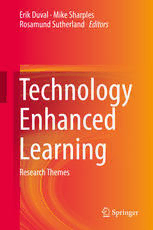Table Of ContentErik Duval · Mike Sharples
Rosamund Sutherland E ditors
Technology
Enhanced
Learning
Research Themes
Technology Enhanced Learning
Erik Duval • Mike Sharples
Rosamund Sutherland
Editors
Technology Enhanced
Learning
Research Themes
123
Editors
ErikDuval(deceased) MikeSharples
DepartmentofComputerScience InstituteofEducationalTechnology
KatholiekeUniversitietLeuven TheOpenUniversity
Leuven,Belgium MiltonKeynes,UK
RosamundSutherland
GraduateSchoolofEducation
UniversityofBristol
Bristol,UK
ISBN978-3-319-02599-5 ISBN978-3-319-02600-8 (eBook)
DOI10.1007/978-3-319-02600-8
LibraryofCongressControlNumber:2017939713
©SpringerInternationalPublishingAG2017
Thisworkissubjecttocopyright.AllrightsarereservedbythePublisher,whetherthewholeorpartof
thematerialisconcerned,specificallytherightsoftranslation,reprinting,reuseofillustrations,recitation,
broadcasting,reproductiononmicrofilmsorinanyotherphysicalway,andtransmissionorinformation
storageandretrieval,electronicadaptation,computersoftware,orbysimilarordissimilarmethodology
nowknownorhereafterdeveloped.
Theuseofgeneraldescriptivenames,registerednames,trademarks,servicemarks,etc.inthispublication
doesnotimply,evenintheabsenceofaspecificstatement,thatsuchnamesareexemptfromtherelevant
protectivelawsandregulationsandthereforefreeforgeneraluse.
Thepublisher,theauthorsandtheeditorsaresafetoassumethattheadviceandinformationinthisbook
arebelievedtobetrueandaccurateatthedateofpublication.Neitherthepublishernortheauthorsor
theeditorsgiveawarranty,expressorimplied,withrespecttothematerialcontainedhereinorforany
errorsoromissionsthatmayhavebeenmade.Thepublisherremainsneutralwithregardtojurisdictional
claimsinpublishedmapsandinstitutionalaffiliations.
Printedonacid-freepaper
ThisSpringerimprintispublishedbySpringerNature
TheregisteredcompanyisSpringerInternationalPublishingAG
Theregisteredcompanyaddressis:Gewerbestrasse11,6330Cham,Switzerland
Preface
This book provides an introduction to research in learning with technology in
classrooms, online and outdoors. Written by leading international researchers, it
coversfoundationaltheoriesandmethodsaswellasrecentresearchintolearningin
virtualworldsandinsocialnetworks.Italsodiscussessocialissuesandimplications
such as whether widening access to digital technologies will decrease or increase
inequalityineducation.
Each chapter in the book covers one theme in technology-enhanced learning
(TEL),discussingandexpandingonfourfoundationalresearchpapersinthattheme.
The chapters, plus the introduction chapter, can be read as a primer for people
new to the field of TEL (also called “e-learning”, “educational technology” or
“cyber-learning”). Or a chapter can be a route to exploring the theme in more
depth, through reading and discussing the selected papers guided by the chapter
commentary. Inevitably, we have had to be selective in coverage, and some areas
of TEL are not discussed in the depth they deserve, including evaluation of TEL
systems, learning through simulations, orchestration of learning with technology
and technology-enhanced learning in subject areas including science, technology,
arts and languages. In this book, you will find pointers to further reading in these
andotherrelatedareas.
TheideaforthisbookcamefromErikDuval,andheguideditsproduction.Erik
was a leader in the STELLAR Network of Excellence in Technology Enhanced
Learning, a stimulating nexus of people and ideas from education, computing,
psychology and the social sciences. Other outcomes from STELLAR include a
VisionandStrategyreportandasetofGrandChallengesinTechnologyEnhanced
Learning.1
Erik Duval died on 12 March 2016 after two years of illness with leukaemia.
Erik’s blog2 starts in 2003 with entries that mix his research interests with
commentariesontechnologyandculture.Ashisillnesstakeshold,theblogcharts
1http://www.teleurope.eu/
2erikduval.wordpress.com
v
vi Preface
inpoignantdetailhisfearsandhopes.Thelastentryfromthe4thofJanuaryends
withtypicaloptimism:“Fornow,I’mmostlyhopefulandconfident:Iwishyouall
ahopefulandconfident2016too!”.
Erik’s work exemplified the interdisciplinarity and continuing innovation of
TEL. He researched and developed the core enabling technologies of learning
objectsandeducationalmetadataandhelpedtoestablishlearninganalyticsasafield
of international research. As a teacher, he embraced open and social technologies,
usinghisblogandTwittertoshareideasandcommunicatewithstudents,andalso
ledpractice-basedcourseswherestudentsworkedtogether,guidedandinspiredby
Erik.Erikinitiatedthiscompendiumofresearchintechnology-enhancedlearning,
as he did many projects, with passion and commitment. In his name, we dedicate
this book to all scholars of technology-enhanced learning who share a devotion to
helpingotherslearn.
Leuven,Belgium ErikDuval
MiltonKeynes,UK MikeSharples
Bristol,UK RosamundSutherland
Contents
1 ResearchThemesinTechnologyEnhancedLearning.................. 1
ErikDuval,MikeSharples,andRosamundSutherland
2 TechnologyandTheoriesofLearning.................................... 11
CharlesCrookandRosamundSutherland
3 ConstructionismandMicroworlds ....................................... 29
RichardNossandCeliaHoyles
4 DesignMethodsforTEL................................................... 37
SusanMcKenneyandYaelKali
5 Computer-SupportedCollaborativeLearning.......................... 47
StenLudvigsenandHansChristianArnseth
6 MassCollaborationwithSocialSoftwareinTEL ...................... 59
UlrikeCressandGerhardFischer
7 LearningSpaces ............................................................ 69
BrettBlighandCharlesCrook
8 MobileLearning............................................................ 89
MikeSharplesandDanielSpikol
9 VirtualWorldsforLearning .............................................. 97
Maggi Savin-Baden, Liz Falconer, Katherine Wimpenny,
andMichaelCallaghan
10 AdaptiveIntelligentLearningEnvironments............................ 109
EelcoHerder,SergeySosnovsky,andVaniaDimitrova
11 Self-RegulatedLearninginTechnologyEnhancedLearning
Environments ............................................................... 115
DonatellaPersicoandKarlSteffens
vii
viii Contents
12 AssessmentforLearning................................................... 127
CarloPerrottaandDeniseWhitelock
13 LearningObjects ........................................................... 137
TomBoyleandErikDuval
14 TechnicalLearningInfrastructure,Interoperability
andStandards............................................................... 145
XavierOchoaandStefaanTernier
15 DigitalDividesandSocialJusticeinTechnology-Enhanced
Learning..................................................................... 157
LyndsayGrantandRebeccaEynon
SelectedPapers................................................................... 169
Index............................................................................... 175
About the Editors and Authors
Editors
ErikDuval was full professor at the Katholieke Universiteit Leuven where he
chaired the Informatics Section of the Computer Science Department and also
chaired the Research Unit on Human-Computer Interaction. His research was
situatedinthelong-standingquesttoaugmentthehumanintellect,withascopethat
included technology-enhanced learning and learning analytics, science 2.0, digital
humanities,personalhealthanddatajournalism.Hediedon12March2016.
MikeSharples is professor of educational technology in the Institute of Educa-
tional Technology at The Open University, UK. He also has a post as academic
lead for the FutureLearn company. His research involves human-centred design
of new technologies and environments for learning. He inaugurated the mLearn
conference series and was founding president of the International Association
for Mobile Learning. He is associate editor-in-chief of IEEE Transactions on
LearningTechnologies.Heisauthorofover300papersintheareasofeducational
technology, science education, human-centred design of personal technologies,
artificialintelligenceandcognitivescience.
RosamundSutherland is professor of education at the University of Bristol
and was formerly head of the Graduate School of Education. Her research is
concerned with teaching and learning with ICT, young people’s use of digital
technologiesoutsideschoolandmathematicseducation.Sherecentlypublishedthe
book Education and Social Justice in a Digital Age, and nowadays she uses her
researchtoinformherworkasgovernorofMerchants’AcademyinSouthBristol.
ix
x AbouttheEditorsandAuthors
Authors
Hans ChristianArnseth isanassociateprofessorintheDepartmentofEducation
attheUniversityofOslo.HeholdsaPhDintheeducationalsciencesinthefieldof
technology-enhanced learning and specialises in how and what students learn in
subjects in school and in their leisure time. His main contributions are in the field
of computer-supported collaborative learning. Based on a sociocultural stance, he
contributes with studies within themes like games and simulations, learning and
identity,scienceeducation,learningacrosssitesandmethodologicalissuesrelated
to discourse and interaction analysis. He is a member of the editorial board of the
theInternationalJournalofComputer-SupportedLearning(IJCSCL).
BrettBligh is a lecturer in the Department of Educational Research at Lancaster
University. He conducts research into the connections between our material sur-
roundings,thetechnologiesthatpermeatethemandthewaysweact,thinkandlearn.
Partofthatresearchinvolves studyingusesoftechnology incomplexinstitutional
settings and attendant approaches to organisational change. Brett uses activity
theorytounderpinhisempiricalworkandalsoinvestigatesthattheoryasaresearch
objectinitsownright.Hiscurrentworkfocussesonacademiccollaborationinthe
designoftechnology-richuniversitylearningspaces.
TomBoyle is emeritus professor at London Metropolitan University and former
director of its Learning Technology Research Institute (LTRI) from 2000 to 2012.
He championed the role of learning design in the learning objects movement as a
complement to the predominantly technical emphasis on metadata and packaging.
Professor Boyle led several projects that used ICT to significantly improve the
quality of the learning experience for students, as measured both by student
evaluation and improved pass rates. He has published widely on technology-
enhancedlearningbothontheoryandpracticalguidestodevelopment.Thelearning
objects for Java that he designed won an EASA (European Academic Software
Award)in2004.
MichaelCallaghan isareaderatUlsterUniversity.Hisresearchinterestsinclude
seriousgames,virtualworlds,remoteexperimentation/laboratories ande-learning.
He is a fellow of the Higher Education Academy, is a distinguished fellow of
the university, is an editor of the International Journal of Online Engineering,
servesontheScientificAdvisoryBoardoftheInternationalAssociationofOnline
Engineering and is a reviewer for a number of IEEE journals and funding bodies
including the AHRC, HEA and EU in his areas of expertise. He has been a grant
holder on funded projects from the AHRC, DETI, INVESTNI, JISC and Higher
EducationAcademy.
UlrikeCress studiedpsychologyandcompletedherPhDwithadissertationabout
self-regulatedlearning.SheisthedirectoroftheLeibniz-InstitutfürWissensmedien
(IWM) and a full professor at the University of Tübingen in the Department of
Psychology.InherlabKnowledgeConstruction,sheresearchessocialandcognitive

